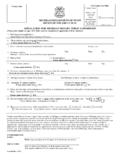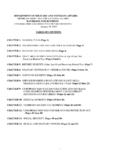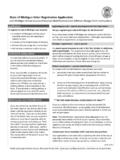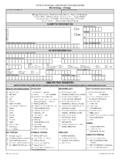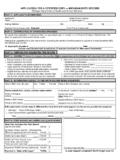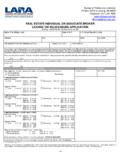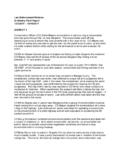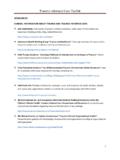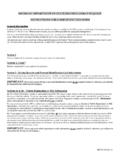Transcription of Employer Insurance Requirements - Michigan
1 Employer Insurance Requirements Subcontractors General Contractors Independent Contractors Michigan department of Licensing and Regulatory Affairs Workers Compensation Agency Box 30016 Lansing, MI 48909 October 2016 2 1. Which employers must carry workers compensation coverage? a. All private employers regularly employing 1 or more employees 35 hours or more per week for 13 weeks or longer during the preceding 52 weeks. b. All private employers regularly employing 3 or more employees at one time.
2 (This includes part-time employees.) c. Agricultural employers if they employ 3 or more employees 35 hours or more per week for 13 or more consecutive weeks. d. Householders employing domestic servants if they employ anyone 35 hours or more per week for 13 weeks or longer during the preceding 52 weeks. e. All public employers. 2. Who is an employee? An employee is any person in the service of another, under any contract of hire, express or implied. A partner is considered an employee of the partnership, a corporate officer is considered an employee of the corporation, and a member who is a manager is considered an employee of a limited liability company.
3 A sole proprietor (self-employed individual) working in his or her sole proprietorship is never an employee of that business. 3. What are the workers compensation coverage Requirements for corporations, limited liability companies, partnerships and sole proprietors? a. Corporations, limited liability companies and partnerships must either have a workers compensation policy or a Notice of Exclusion Form, WC-337, on file with this office. The owner(s) are considered an employee(s) of the business.
4 If you have any employees or use subcontractors, a workers compensation policy is required for your business. b. Sole proprietors only require a workers compensation policy when they have 1 full time or 3 part-time employees. The owner of a sole proprietor is not considered an employee of the business. 4. What must an Employer do to satisfy the requirement for workers compensation coverage? a. Purchase a policy from a licensed and approved Insurance carrier. Contact your Insurance agent for further information.
5 B. Purchase a policy through the assigned risk pool. Contact the Compensation Advisory Organization of Michigan at c. Secure coverage through a self-insured group fund. Following is the link to the list of self-insured group funds: d. Receive authorization from the Workers Compensation Agency (Agency) director to be an individual self-insurer. The Self-Insured Division can be reached at 517-284-8939. e. File an exclusion form with the Insurance Compliance Division of the Agency. This division can be reached at 517-284-8922.
6 3 5. What is an exclusion form? It is a form provided by the Insurance Compliance Division (WC-337) which is completed by the Employer and filed with the Agency. The form may be used by employers who only employ persons who can be excluded under the Workers Disability Compensation Act (Act). The proper filing of this form allows the Employer to comply with the Insurance Requirements of the Act without purchasing a policy of workers compensation Insurance . After the completed form is filed with the Agency, the excluded employees are barred from receiving workers compensation benefits.
7 6. Which employers may use an exclusion form? An Employer may use an exclusion form only if all its employees can be excluded according to the Act and no subcontractors are used in the operation of the business. The following employers may exclude employees: a. Sole Proprietorship: If it has one or more employees and all employees are the spouse, child or parent of the sole proprietor. b. Partnership: If all employees are partners. c. Stock Corporation: If all employees are corporate officers and own 10% or more stock in the corporation.
8 D. Limited Liability Company: If all the employees are members and are also managers and own 10 percent or more interest in the business. 7. What is the purpose of an exclusion form? By filing an exclusion form a business certifies that it fits into one of the categories described in Question 6. The exclusion form does not establish anything about the relationship between that business and a contractor. 8. An Employer has four full-time employees. However, only two of the employees can be excluded under the Act.
9 Can the Employer properly use the exclusion form? No. The Employer must purchase a policy of workers compensation Insurance . The Employer then may exclude one or both of the excludable employees from the policy which may save the Employer premium dollars. Contact your Insurance agent for details. 9. May a sole proprietor with no employees use an exclusion form to prove that he or she is an independent contractor? No. The Agency will return all exclusion forms filed by a sole proprietor with no employees.
10 Question 6 explains which employers may use an exclusion form. Question 11 lays out some of the criteria that must be met in order to be considered an independent contractor. 10. Can a sole proprietor be covered under a workers compensation policy? No. A sole proprietor cannot receive workers compensation benefits under a policy issued to the sole proprietorship or the general contractor (principal contractor) when the sole proprietorship operates as an independent contractor. 4 However, individuals who choose to establish their business as a partnership, corporation, or limited liability company may be covered as employees and may receive workers compensation benefits from their partnership, corporation, or limited liability company.
